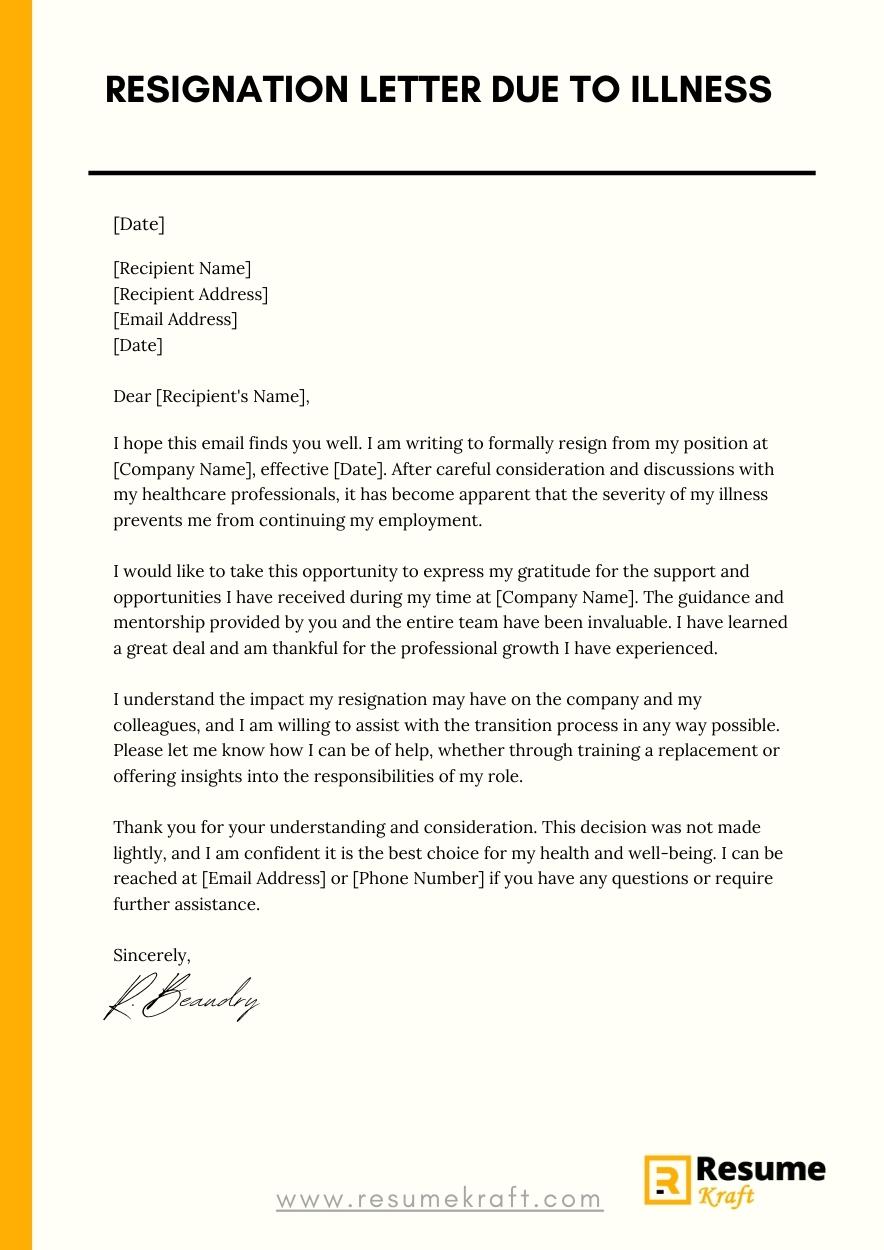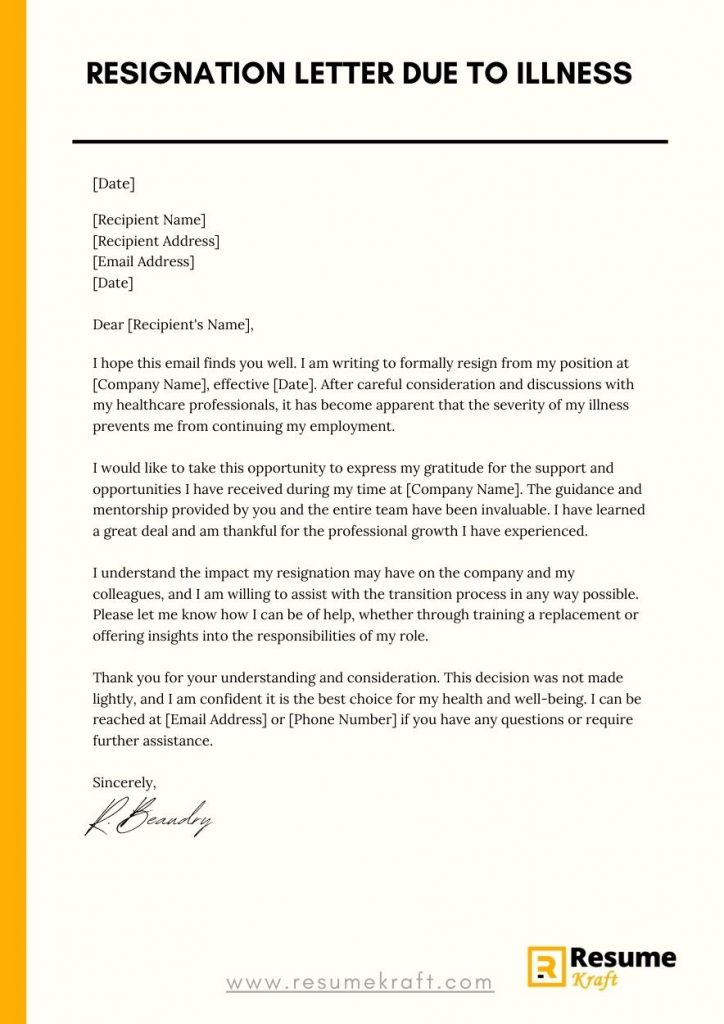
If you find yourself unable to continue working due to illness, it is important to communicate your resignation in a professional and respectful manner. A resignation letter is a formal document that notifies your employer of your decision to leave the company. In this article, we will guide you on how to write a resignation letter specifically for cases where illness prevents you from continuing your employment. We will provide you with a step-by-step guide, samples, and tips to ensure your resignation letter is effective and compassionate.
What To Include in a Resignation Letter Due to Illness
When composing your resignation letter due to illness, there are several key elements you should include to ensure clarity and professionalism:
- Greeting: Begin the letter with a formal salutation, addressing your immediate supervisor or manager by name.
- Statement of resignation: Clearly state your intention to resign from your position due to illness. Make sure to mention the date from which your resignation is effective.
- Explanation: Briefly explain the nature of your illness and how it impacts your ability to perform your job duties. However, it is not necessary to disclose specific medical details.
- Gratitude: Express your appreciation for the opportunities and experiences you have had while working for the company.
- Offer of assistance: If possible, offer to help with the transition process or provide suggestions for finding a suitable replacement.
- Closing: End the letter with a professional closing and your full name and contact information.
What Not to Include in Your Resignation Letter Due to Illness
While it is important to provide the necessary information in your resignation letter, there are certain things you should avoid including:
- Negative comments: Refrain from making negative remarks about the company, colleagues, or working conditions. Maintain a positive tone throughout the letter.
- Unprofessional language: Use professional and respectful language in your resignation letter. Avoid using slang, jargon, or informal expressions.
- Excessive details: While it is important to provide an explanation for your resignation, avoid going into unnecessary medical details. Keep the focus on your decision to resign.
How To Format a Resignation Letter Due to Illness
To ensure your resignation letter is well-structured and easy to read, follow these formatting guidelines:
- Use a professional tone: Address your supervisor or manager respectfully and maintain a professional tone throughout the letter.
- Choose a clear and concise language: Keep your sentences short and to the point. Use simple language that is easily understandable.
- Use a formal letter format: Include your contact information, the date, the recipient’s information, and a formal salutation. Use paragraphs for each section of the letter.
- Keep it brief: A resignation letter should be concise and typically no longer than one page.
- Proofread and edit: Double-check your resignation letter for any grammatical errors or typos. Make sure the information is accurate and the letter is well-structured.
Now let’s take a look at some resignation letter samples for different situations.
Resignation Letter Due to Illness Samples

Printed Resignation Letter Sample
[Your Name]
[Your Address]
[City, State, ZIP]
[Email Address]
[Phone Number]
[Date]
[Supervisor/Manager’s Name]
[Company Name]
[Company Address]
[City, State, ZIP]
Dear [Supervisor/Manager’s Name],
I am writing to formally resign from my position at [Company Name], effective [Date]. Unfortunately, my ongoing health issues have progressed to a point where I am no longer able to perform my job duties effectively.
I want to express my sincere gratitude for the support and opportunities I have been given during my time at [Company Name]. It has been a pleasure working with such a dedicated and talented team, and I am grateful for the skills and experiences I have gained.
Despite my resignation, I am committed to ensuring a smooth transition. If there is any assistance I can provide to help train a replacement or transfer my responsibilities, please let me know.
Thank you again for your understanding and support during this difficult time. I will be focusing on my recovery and hope to return to the workforce in the future. I can be reached at [Email Address] or [Phone Number] if you require any further information or assistance.
Sincerely,
[Your Name]
Email Resignation Letter Example
Subject: Resignation Letter Due to Illness
Dear [Supervisor/Manager’s Name],
I hope this email finds you well. I am writing to formally resign from my position at [Company Name], effective [Date]. After careful consideration and discussions with my healthcare professionals, it has become apparent that the severity of my illness prevents me from continuing my employment.
I would like to take this opportunity to express my gratitude for the support and opportunities I have received during my time at [Company Name]. The guidance and mentorship provided by you and the entire team have been invaluable. I have learned a great deal and am thankful for the professional growth I have experienced.
I understand the impact my resignation may have on the company and my colleagues, and I am willing to assist with the transition process in any way possible. Please let me know how I can be of help, whether through training a replacement or offering insights into the responsibilities of my role.
Thank you for your understanding and consideration. This decision was not made lightly, and I am confident it is the best choice for my health and well-being. I can be reached at [Email Address] or [Phone Number] if you have any questions or require further assistance.
Best regards,
[Your Name]
Key Takeaways
- Compose a resignation letter due to illness with a professional and respectful tone.
- Clearly state your intention to resign and provide a brief explanation of your illness.
- Express gratitude for the opportunities and experiences gained during your employment.
- Offer assistance with the transition process if possible.
- Format your resignation letter using a standard letter format.
Frequently Asked Questions (FAQs)
1. Can I mention specific medical details in my resignation letter due to illness?
It is not necessary to disclose specific medical details in your resignation letter. While it’s important to explain the nature of your illness and how it impacts your ability to work, you can maintain privacy by providing a general explanation without going into specific medical details.
2. Should I mention my intention to return to work in the resignation letter?
While it is not required, you can mention your intention to return to work in the future if it is appropriate. However, keep in mind that the focus of the resignation letter should primarily be on your current inability to continue working due to illness.
3. Should I notify my employer about my illness before submitting a resignation letter?
Ideally, it is advisable to inform your employer about your illness and discuss any necessary steps or accommodations before submitting your resignation letter. This can help establish open communication and ensure that the company is aware of the situation.
4. What if I do not have the resources to provide assistance with the transition process?
If you are unable to provide assistance with the transition process due to your illness, it is important to communicate this in your resignation letter. Express your willingness to help in any way possible, but also mention any limitations you may have. Your employer will appreciate your honesty and understanding of your limitations.
5. Is it essential to express gratitude in a resignation letter due to illness?
Expressing gratitude in your resignation letter is highly recommended. It reflects professionalism and appreciation for the opportunities and experiences you have had while working for the company. Showing gratitude can leave a positive impression and maintain a good relationship with your employer and colleagues.
6. Can I submit my resignation letter due to illness electronically?
Yes, you can submit your resignation letter due to illness electronically. In today’s digital age, email is a widely accepted and efficient method of communication. Ensure that your email is professional, clearly states your intention to resign, and includes all the necessary elements mentioned earlier in the article.
7. What if I require a medical leave instead of resigning?
If your illness requires a temporary leave from work rather than a permanent resignation, it is advisable to consult with your employer and HR department about the appropriate steps to take. Many companies have policies and procedures in place for medical leaves of absence, and it is important to follow those protocols accordingly.
8. Should I include any supporting documents with my resignation letter?
Unless specifically requested by your employer or HR department, it is generally not necessary to include supporting documents such as medical certificates or doctors’ notes with your resignation letter. However, be prepared to provide any required documentation if asked by your employer for record-keeping purposes.
9. Will I be entitled to any benefits or compensation after resigning due to illness?
The entitlement to benefits or compensation after resigning due to illness varies depending on the country, company policies, and employment agreements. It is best to refer to your employment contract, consult with HR, or seek legal advice to understand your specific rights and entitlements in your situation.
Conclusion
Writing a resignation letter due to illness requires a compassionate and professional approach. By following the guidelines and utilizing the provided samples, you can effectively communicate your resignation while expressing gratitude and offering assistance. Remember to keep the letter concise, proofread for any errors, and maintain a professional tone throughout.

